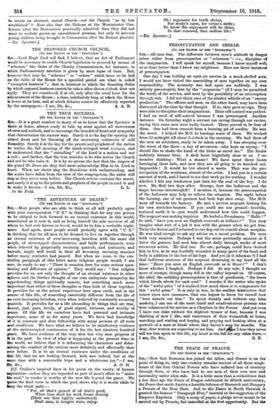" THE ADVENTURE OF DEATH."
[To THE EDITOR OP THE " SPECTATOR."] Snt,—Most people who are able to think at all will probably agree with your correspondent " C. S." in thinking that for any one person to be obliged to look forward to an eternal existence in this world, constituted as it now is, and as being himself the sole survivor of all whom he had ever known or loved, would be to him a veritable night- mare. And again, most people would probably agree with " C. S." fn thinking that for all men to be doomed to live on together through an eternal existence of ever-increasing boredom with the same old people, of stereotyped characteristics, and futile performances, even when relieved by perpetually recurring quarrels, and jealousies, and hatreds, might well result in their all becoming ravening maniacs before many centuries had passed. But when we come to the con- eluding paragraph of this letter many religious people would, I am sure, be ready to say : " There is occasion here for some serious ques- tioning and difference of opinion." They would say : " Our religion provides for us, not only the thought of an eternal existence in other spheres and the further thought of our own embryonic incapacity for apprehending things spiritually remote, but something much more Important than either of these thoughts or than both of them together. It provides for us the actual experience here upon earth, and in the course of this life, of something essentially different from the life of an ever-increasing boredom, even when relieved by constantly recurring quarrels. It provides for us a life abounding in things that are true; honest, just, pure, lovely, of good report, virtuous, and worthy of praise. Of this life we ourselves have had personal and intimate experience, some of us for many years. We have had knowledge of it in constant and close fellowship with many persons of all sorts and conditions. We have what we believe to be satisfactory evidence of the uninterrupted continuance of it for the last nineteen hundred years. We have evidence of the very slow but very sure progress of M in the past. In view of what is happening at the present time in the world, we believe that it is influencing the characters and deter- mining-the conduct of the nations more definitely and effectually than ever before. It is to an eternal existence under the conditions of this life that we are looking forward, with awe indeed, but at the same time with a reasonable hope and a wholesome joy."—I am,
Or, &o., A. O. D.
[Cf. Crabbe's inspired lines in his poem on the vanity of human aspirations—unless they are regarded as part of man's effort to " make his soul," to render it worthy of the new life beyond the grave. We quote the final verse in which the poet shows why it is worth while to seep the strait path: " For, all that's gained of all that's good, When time shall his weak frame destroy (Their use then rightly understood) Shall man, in happier state, enjoy. Oh ! argument for truth divine, For study's cares, for virtue's strife ; To know the enjoyment will be thine, In that renewed, that endless life 1 " —En. Spectator.]






























 Previous page
Previous page